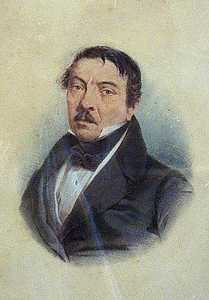Ramon Carnicer
| Ramon Carnicer | |
|---|---|
 Portrait of Carnicer, c. 1830 | |
| Born |
Ramon Carnicer i Batlle October 24, 1789 Tàrrega, Catalonia, Spain |
| Died |
March 17, 1855 (aged 65) Madrid, Spain |
| Residence | until 1796, Tàrrega; 1796-1806, La Seu d'Urgell; 1806-1808 and 1814-1823, Barcelona; 1808-1814, Mahon; 1823-1827, Paris and London; 1827-1855, Madrid |
| Nationality | Spanish |
| Education | Carles Baguer |
| Occupation | Composer, conductor and opera house director |
| Known for | Chile national anthem, ouverture for Il barbiere di Siviglia |
| Spouse(s) | married |
| Children | yes |
| Relatives | brother: Miquel Carnicer (1796-1866), guitarist |
Ramon Carnicer i Batlle (October 24, 1789 – March 17, 1855)[1] was a Catalan composer and opera conductor, today best known for composing the National Anthem of Chile.
Biography
Carnicer was born in Tàrrega, Catalonia (Spain). His first major positions were as conductor for the opera, and he was influential in the development of the Spanish national opera style, zarzuela. He conducted the Italian Opera in Barcelona from 1818 to 1820, and the Royal Opera in Madrid from 1828 to 1830, as well as composing nine operas.[1]
In 1830, he accepted a position as professor of composition at the Madrid Conservatory, which he would retain until his retirement in 1854. He composed a variety of songs, church music, and symphonies; his best-remembered composition today being the National Anthem of Chile. He died in Madrid in 1855.[1]
Works
Opera
Some of his operas are lost, but are known from references in documents of the period. However the authorship of several of the pieces is not fully clear.
- Adele di Lusignano: Melodramma semiserio (1819), Opera in Italian, in two acts
- Elena e Costantino: Dramma eroico-comico in due atti (1821, premiered again in 2005), Opera in Italian, libretto by Andrea Leone Tottola [2]
- Il dissoluto punito, ossia Don Giovanni Tenorio (1822, premiered again in 2006), Opera in Italian, in two acts, libretto by Giovanni Bertati.
- Elena e Malvina (1827), Opera in two acts
- Cristoforo Colombo (1829), Opera
- Eufemio di Messina (1832), Opera
- Guglielmo Tell (1834), Opera
- Eran due or sono tre, o sea, Gli esposti (1836), Opera buffa in two acts. Libretto by Jacopo Ferretti
- Ismalia o Morte ed amore (1838), Opera in two acts
- Laura y Don Gonzalo (1841), òpera in 4 acts. Music attributed to Carnicer. Libretto attributed to Manuel Bretón de los Herreros
- Ipermestra (1843), drama in three acts. Words by Pietro Metastasio. Authorship discussed
- Lucrezia Borgia. Attributed opera, some believe he only collaborated in the composition
- El sacristán de Toledo, opera. It's said he had only collaborated, composing incidental music
Instrumental
- Fantasía en mi bemol mayor, for clarinet
- Gran sinfonía en Re (1839)
- Fantasía original para clarinete con acompañamiento de piano (1849) [3]
- Capricho para contrabajo con acompañamiento de piano (1852) (Capricho for doublebass with piano accompaniment) [4]
- Melodía fantástica con acompañamiento de piano
- Sinfonía oriental
- Solo de flauta (solo for flute)
- Salmòdia for organ
- 6 Sonates per a instrument de tecla' [5]
- Obertura (sinfonía) Composed for the premier of the opera Il barbiere di Siviglia by Rossini in Barcelona (1818) [6]
- A second overturefor that same opera
Vocal
- El caramba: canción andaluza (ca. 1832), Voice and piano or guitar [7]
- Completas Fratres a 4 v., 4 voices, 6 instruments, accompaniment and continuo
- La criada: canción española (ca. 1832), voice, guitar and piano
- El currillo: canción andaluza (ca. 1835), voice, guitar and piano
- La gitanilla (ca. 1831), song for voice, guitar and piano
- Himno a los defensores de Gandesa (1838).
- Himno patrio de la República de Chile (1828)
- Himno patriótico, con motivo de la publicación del Estatuto Real (1834)
- Himno patriótico [para el] cumpleaños de la Reina Doña Isabel II (1835)
- El julepe: polo (1823), song for voice and guitar
- Misa de Réquiem (1929), 4 voices and orchestra, in Latin. For Maria Josepa from Saxonia, Ferran VII therd wife
- Misa de Réquiem (1842), 4 voices and orchestra, in Latin
- Misa solemne (entre 1806 i 1808), 8 voices and orchestra
- El músico y el poeta (Los maestros de la Raboso), tonadilla a dúo
- El no sé, song for voice, guitar and piano
- La noticia feliz: polo y seguidillas (1823), song for voice, guitar and piano
- El nuevo sereni (1825), song for voice, guitar and piano or guitar [8]
- Odas de Anacreonte (1832), text original grec d'Anacreont i traducció castellana de José del Castillo y Ayensa, comprèn les cançons per a veu i piano De si mismo, A una muchacha i Del amor y la abeja [9]
- El poder de las mugeres: canción española con acompañamiento de piano y guitarra (1836)
- Psalmodia que contiene todos los tonos (1818)
- Tantum Ergo
- Tonadilla de la cantinera (1813)
- Vigilias con orquesta para las exequias de Fernando VII (1833), in Latin
- El chairo: canción española cantada en la ópera "El barbero de Sevilla" (1833), lyrics by Agustín Azcona
References
- ↑ 1.0 1.1 1.2 Nicolas Slonimsky, ed. (1958). "Carnicer, Ramón". Baker's Biographical Dictionary of Musicians (5th ed.). G. Schirmer Inc. p. 253.
- ↑ Ressenya periodística de la reestrena Edited: Madrid: Instituto Complutense de Ciencias Musicales, 2005
- ↑ published in a modern edition. Barcelona: Tritó, 2002
- ↑ published in a modern edition by Boileau, 2011.Transcription and revition: Jordi Soler
- ↑ One of them published in a modern edition. Ramon Carnicer. Sonata número 6 per a orgue o forte piano, edició de Maria Assumpció Ester-Sala. Sabadell: La Mà de Guido, 1988
- ↑ Modern edition. Barcelona: Tritó, 1994
- ↑ Fragment de la partitura, en facsímil
- ↑ Facsímil de la partitura
- ↑ Editada modernament en text original i traduccions catalana i castellana. Barcelona: Tritó, 1997
|